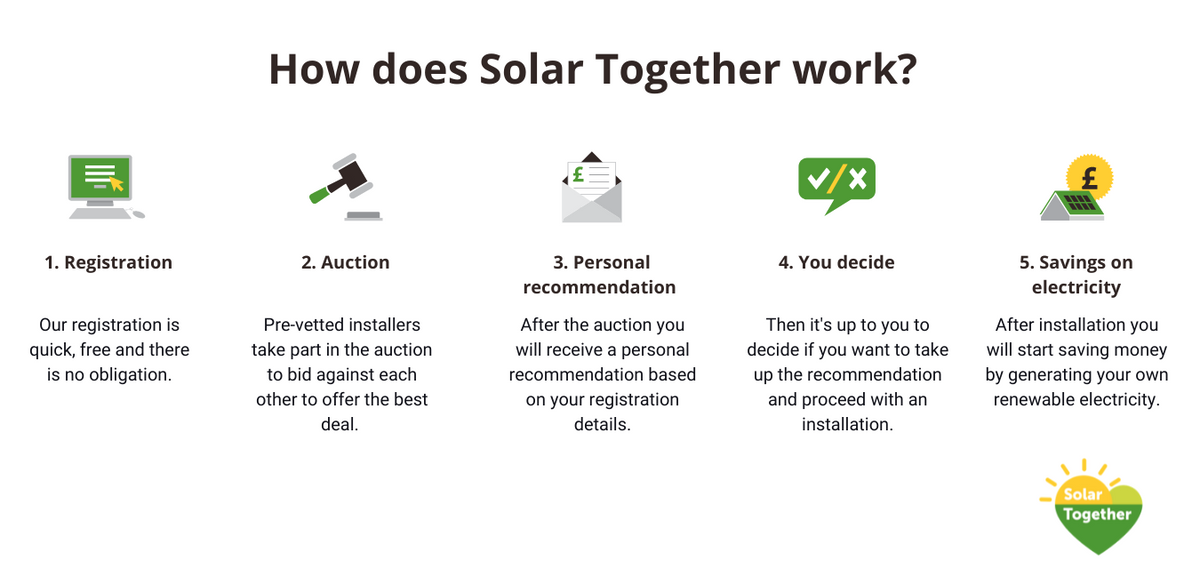Renewable energy
Renewable energy, generated from natural resources such as wind, water, sun and biomass, have the potential to supply 100% of the UK’s power.
They are non-polluting and are in limitless supply thereby providing us with a sustainable option for our future energy needs.
Generating your own energy from renewables Toggle accordion
Solar power
Solar power is ideal for urban living since solar energy systems can be easily integrated into the existing structure of a building. Solar energy can be used to provide either electricity or heat.
Solar photovoltaic (PV) systems convert the suns energy into electricity. Contrary to popular belief they do not require direct sunlight to generate electricity and are therefore suitable in our northern climate. Many systems allow the householder to connect a two-way meter so that any excess electricity can be sold to the grid.
There are online calculators available, an example is www.fmb.org.uk/homepicks/solar-panels/cost-of-solar-panels, which can help you to assess the cost and payback of a solar PV system for your specific home and seek estimates from installers.
Solar thermal systems
These absorb heat from the sun which can be used to heat domestic hot water. There are two different available types of solar thermal collectors – evacuated tube and flat plate collectors. Evacuated tube collectors are more efficient but also more expensive. A typical solar thermal system, when fitted to a south-facing roof, will supply around 72% of a household’s hot water over a year (a boiler or immersion heater is usually also required during winter). They are probably the most cost-effective domestic renewable energy technology that can be installed in this country, with the shortest payback time.
Ground and air source heat pumps
Ground source heat pumps transfer heat from the ground into a building to provide space heating and in some cases pre-heat domestic hot water. Some electricity is used to power the pump but for every unit of electricity used, 3-4 units of heat are produced, making it an efficient way of heating a building. The system is ideal for new build homes and there are no planning issues given the underground nature of the system. You will need space outside for the ground loop and the heat generated can be linked to existing systems, though it is ideally suited to households with underfloor heating.
Micro wind power
Whilst there is little potential within the St Albans district for large-scale wind turbines, there are many opportunities for small scale domestic turbines, called micro-turbines. These can be integrated into a building by being fitted to the roof or on a mast.
Micro-turbines typically cost from £1,500-£20,000. The effectiveness of micro-turbines is highly dependent on wind speed and the surrounding land-use so are most suitable for properties in a rural location, where there is open exposure free from turbulence and obstructions from surrounding buildings or trees. If you are considering a wind turbine it is advisable to have a professional assessment of wind-speed in the exact location of the turbine over a year.
Wood-fuelled heating systems
Biomass boilers use wood fuel in the form of pellets, chips or logs to power central heating, provide warmth and hot water. This system of heating may either consist of a standalone stove which may also be connected to a back boiler to provide hot water or a wood burning boiler connected to a central heating and hot water system. They do contribute to particulate air pollution so are not a perfect alternative to gas or electricity.
Solar Together Toggle accordion
Solar Together Hertfordshire
St Albans City and District Council has partnered with independent group-buying experts, iChoosr Ltd. to bring this opportunity to St Albans District homeowners.
Solar Together is an innovative new scheme offering high quality solar panels and battery storage. It is a group-buying scheme which brings local households together to obtain renewable energy at competitive prices, helping you through the process and keeping you informed at every step of the way.
Do you need Planning Permission:
Solar Panels are considered 'Permitted Development' and in most cases will not need planning permission. However in some cases, such as Listed Buildings and in Conservation Areas, Planning permission may be required. Please refer to this document for more information.
What if I already have solar panels?
If you already have solar panels installed, you can also register to have battery storage added to maximise the benefits of the system.
How it works:
- When the scheme opens, households are invited to register for the scheme until 25 April 2025. It's free to register and there is no obligation to go ahead with installation.
- Pre-approved UK Solar PV installers will then participate in a reverse auction. They will be able to offer competitive pricing as the volume and geographic concentration makes it possible for them to realise greater efficiencies, which they pass on as lower cost installations.
- After the auction, registered households will be emailed a personal recommendation and price based on the information they provided. This will be around 23 March 2025. Households then have six weeks to accept the offer.
- Once accepted, the specifics of the recommendation will be confirmed with a technical survey. Acceptance closes on 16 May.
- A date will be agreed for the installation.
To take part in St Albans Solar Streets and to register your interest, please visit: www.solartogether.co.uk/st-albans/home

Planning requirements Toggle accordion
The planning rules have been simplified to make it easier for those wishing to install renewable technology. Please refer to the Planning Portal website for information on the rules.
Special considerations are likely to apply to listed buildings or those sited within the green belt or conservation areas.
Within conservation areas, inconspicuous positions for installations are encouraged, however this may mean that solar panels cannot be placed on the south facing slope of the roof.
If you are wondering whether you need planning permission to install solar panels, please see this page:Solar Panel Guidance.
Grants and funding for renewable technologies Toggle accordion
Grants for energy efficiency sometimes include provision for renewable technology so please check this page: Energy Efficiency.
Renewable Heat Incentive (RHI): The Domestic RHI provides a financial incentive to households to install heat-generating renewable technologies such as biomass boilers, air or ground source heat pumps and solar thermal systems.
Payments are made on an annual basis according to an estimation of the amount of heat generated. An essential criterion for joining the Domestic RHI is that the renewable heating system heats only a single domestic household, which is evidenced by obtaining an Energy Performance Certificate (EPC).
For further details visit the Ofgem website. In cases where the renewable heating system is in commercial, public or industrial premises (including hospitals, schools and organisations with district heating systems), application may instead be made to the Non-Domestic RHI. The RHI closes to new applications on 31 March 2022.
Buy renewable energy Toggle accordion
If you want to see provision for renewable energy improved in the UK, choosing a green energy tariff is a great start.
Choose a tariff where the energy supplier can demonstrate that for every unit of energy you purchase, they will fund equivalent renewable resource, 'additional' to their statutory obligations.
Switching is free and there are websites to help you do this. We suggest you use an Ofgem accredited switching service. Remember to tell your old supplier why you are switching!

